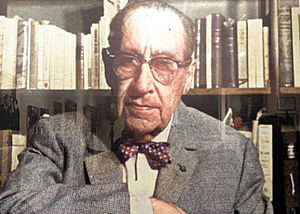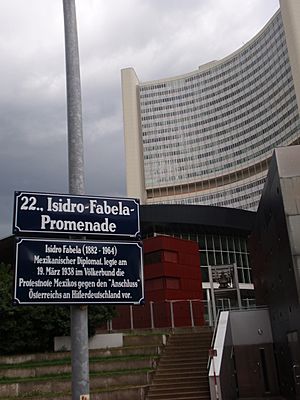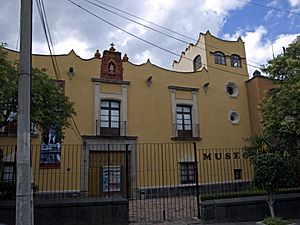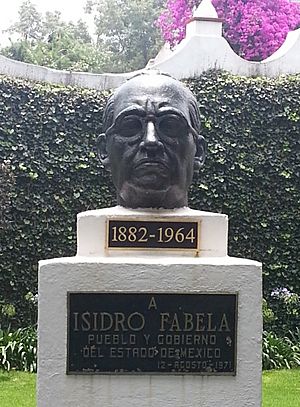Isidro Fabela facts for kids
José Isidro Fabela Alfaro (born June 28, 1882 – died August 12, 1964) was an important Mexican leader. He was a judge, politician, professor, writer, and diplomat. He also served as the governor of the State of Mexico.
Fabela was born in Atlacomulco, Mexico State. He was part of a group of smart thinkers who were against the rule of Porfirio Díaz. This group was called the Ateneo de Juventud, and it included famous people like José Vasconcelos and Diego Rivera. Fabela worked closely with revolutionary leader Venustiano Carranza and held many key jobs in the Mexican government.
Contents
Life and Work
Early Life and Education
Isidro Fabela studied law at the National School of Law, which is part of the National Autonomous University of Mexico (UNAM). He earned his law degree in 1908. Later, in 1921, Fabela returned to UNAM to teach International Public Law. Before that, he taught history in Chihuahua and at the Literary Institute of Mexico.
During the Mexican Revolution
Fabela held many government jobs during the time of the Mexican Revolution. In 1911, he worked as a Chief Public Defender. He was also a secretary general in Chihuahua and Sonora.
From 1912 to 1914, Fabela was a federal deputy (like a representative) for the State of Mexico. He served in this role again from 1922 to 1923. In 1942, Fabela became the Governor of the State of Mexico, serving until 1945. After that, he was elected as a Senator for Mexico State in 1946. He later left this job to become a Judge at the International Court of Justice.
In 1913, Isidro Fabela briefly went to Cuba. This happened after he spoke out against the government's actions, especially the unfair arrest of a newspaper editor.
International Roles
Isidro Fabela had many important international jobs. He was the Secretary of Foreign Relations for the government of Venustiano Carranza from 1913 to 1915. In this role, he managed who could meet Carranza and what questions the press could ask. He also defended the actions of the government during difficult times.
In 1915, Fabela was a special diplomat to Italy and Spain. The next year, he became a Minister to several South American countries, including Argentina, Brazil, Chile, and Uruguay. From 1918 to 1920, he was a Special Ambassador to Argentina.
In 1937, Fabela became the Mexican Delegate to the International Office of Labor at the League of Nations. He served there until 1940. A very important moment was in 1938. As the voice of the Mexican Delegation, he spoke out against the annexation of Austria by Nazi Germany. Mexico was the only country in the world to officially protest this action at the League of Nations.
To remember this brave act, a promenade (a walking path) in Vienna, Austria, was named after him. It is located near the United Nations headquarters there.
While at the League of Nations, Fabela also argued for supporting the Spanish Republic during the Spanish Civil War. He believed that there should be a clear difference between those who attacked and those who were victims.
After World War II, Fabela was appointed as a Judge for the International Court of Justice in 1946. He worked there until 1952.
As a Writer
Isidro Fabela also founded two newspapers: La Verdad in 1910 and El Pueblo in 1914. He wrote several books, including:
- La tristeza del amor (The sadness of love)
- Los prescursores de la diplomacia mexicana (The pioneers of Mexican diplomacy)
- Historia diplomática de la Revolución Mexicana (Diplomatic History of the Mexican Revolution)
- Documentos históricos de la Revolución Mexicana (Historical Documents of the Mexican Revolution)
- Mis memorias de la Revolución (My Memories of the Revolution)
Legacy
Mentoring Adolfo López Mateos
Isidro Fabela is often called the "political father" of Adolfo López Mateos, who later became President of Mexico. Fabela helped Mateos start his career. He first appointed Mateos as a director at a scientific institute. When Fabela became a Senator, he made Mateos his "Alternate Federal Senator," allowing Mateos to vote when Fabela was away. When Fabela left to become a judge, Mateos took over his senator position.
Isidro Fabela Cultural Center
Isidro Fabela's home in San Ángel was given to the Mexican Government in 1958. It was then turned into the Isidro Fabela Cultural Center. This center is also known as "Casa del Risco." It is considered a historical monument and holds a large collection of art that once belonged to Fabela. The collection includes sculptures, furniture, and other art pieces. The center also has a big library, an archive, and an auditorium.
Awards and Honors
Belisario Domínguez Medal of Honor
In 1960, Isidro Fabela received the Belisario Domínguez Medal of Honor. This is the highest award given by the Mexican congress. The Senate of Mexico gives this award every year to important Mexicans who have made great contributions "toward the welfare of the Nation and mankind."
Medalla Isidro Fabela
The National Autonomous University of Mexico (UNAM) has a medal named after Isidro Fabela. The Medalla Isidro Fabela is given to people who show "steadfastness for the values that sustain the culture and democracy in our region." Some famous people who have received this medal include José Luis Rodríguez Zapatero and José Saramago.
See also
 In Spanish: Isidro Fabela Alfaro para niños
In Spanish: Isidro Fabela Alfaro para niños
 | Jessica Watkins |
 | Robert Henry Lawrence Jr. |
 | Mae Jemison |
 | Sian Proctor |
 | Guion Bluford |





